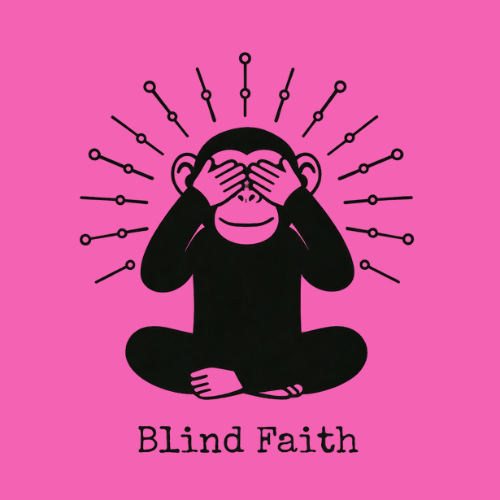This Charming Life
He handed me agency.
Not on purpose.
He just didn’t have a plan.
When I started, he let me experiment with new communication tools. He didn’t really understand what I was doing, and for a while, that was the gift.
He gave me space, and I followed my gut. It worked.
He was my manager, but I never saw him as my superior. Maybe that was the problem for him.
Because that kind of arrangement—the one where he needs to feel essential, where my independence starts to look like defiance…is never going to let me do my best work.
And that’s what he said he wanted, right? Maybe. But not more than being able to claim the success for himself.
I’ll always be grateful that he saw talent in me and welcomed me into sales. But that gratitude ends where he expected me to stay charming and be graceful about the control.
The system I built started producing results fast- so fast it surprised him. I understood the tools, and I knew how to reach people he couldn’t reach, especially the ones who didn’t look or think like him.
Once, a female CEO interrupted him mid-sentence and asked me to answer instead. He laughed it off, but I felt the balance shift.
The problem came later—with my quick success. I can see his quandary now: How do you multiply this success and keep her from getting a big head?
You praise the results, hire other women and replicate her strategy across a team, then quietly deny her ownership of the decisions behind it. Recognition for the wins, never for what created them.
He called us The Girls. He asked me to teach them everything I knew—the tools, my messaging, my cadence. He said it was teamwork. It was transfer—of my system and of my power.
And I stayed. Another year.
That’s when the anger grew. When I knew I was stuck and couldn’t find a clean way out.
When I finally asked for acknowledgment, a raise, a chance to lead marketing, he said no.
Said I was getting ahead of myself.
Said I was emotional.
Said I needed guidance and to trust him.
When I got frustrated, he called it…well, I don’t what he called it. But that’s when I drank—not to disappear, just to quiet the ache of being both indispensable and invisible. But then he called it over. That was my first dismissal by him.
Years later we reconnected. I was in a transitional time, and I asked him what I should do. Why? Because I wanted to test my theory. I wanted him to show himself. And show himself he did.
He told me I was “high EQ.” That I’d be great at selling an experience. He mentioned jets. Yachts. Luxury.
On the surface, it was an idea about money, about where I could “fit.” But it landed like a reroute—as if he was moving me from building something to decorating it.
As if my intelligence were best used to make other people feel rich. Not to make systems smarter.
Maybe that’s why it felt gross. Not because it was a bad idea. But because it was a small one—another minimization disguised as opportunity, a reframe that kept me shiny and contained.
Five months later, I started building the framework for EPI.
It wasn’t charm. It was pattern recognition. It was emotional architecture.
Because my outreach those years before had worked for a reason. It was human. It was real.
I was sending video messages, looking people in the eye. Not to lure them in, but to meet them where they were. Empathy wasn’t manipulation. It was method.
But he couldn’t see that.
To him, empathy was a parlor trick.
Connection was charisma.
Intuition was accident.
He couldn’t recognize emotional intelligence unless it served his own authority. Anything relational, intuitive, humane—he flattened it into personality.
The feminine form of strategy.
The people around us never saw what was happening. To them, it looked like mentorship—a talented woman being coached by a confident leader.
They saw structure. They didn’t hear tone.
What they couldn’t hear was how praise and power trade places.
How encouragement becomes containment.
How the word “potential” becomes a leash.
He used tone as leverage.
Praise to recruit.
Withholding to regulate.
Silence to erase.
That’s what Emotional Pattern Intelligence was built to detect—tone that hides hierarchy, mentorship that masks control.
EPI reads the emotional fingerprints in communication—the empathy imbalance, the withheld repair, the subtle power shifts that tell the real story.
Because this isn’t just about performance. It’s about authorship.
When I first built EPI, I thought it was a tool. A way to understand tone abuse in text. It’s more than that. It’s a way to reclaim truth. To map the patterns polite systems call “leadership.”
The other day, I sent him the EPI demo. He didn’t respond. And maybe that silence says everything.
Because EPI does what he couldn’t allow me to do: name the pattern that made him powerful.
And then there’s Mike. My husband. The best partner I’ve ever known. He wants to help, to fix, to make sense of things, and I know it comes from love.
But sometimes, when he offers another way to see it, it lands like minimization instead of care. And I start talking faster, longer, trying to prove that what I felt was real.
That’s the loop. The one women know too well.
If I just had reflection, not even agreement, I wouldn’t keep circling. It isn’t validation I’m chasing. It’s recognition.
That reflex didn’t start with him. It started with another partner, bosses in between—those who believed all success attached to me belonged to them. To be given or taken away.
If I achieved something outside their definition, they reclaimed the credit or questioned the motive.
Called it ego when it was agency.
Called it selfish when it was self-trust.
That pattern teaches you to doubt your own interpretation. To narrate yourself until someone finally nods.
So now, when Mike offers a fix, my body still remembers the earlier correction. It takes a breath before it realizes he’s not the same.
When women feel their perception isn’t accepted at first hearing, they start to self-doubt. A few redirections, a quiet are you sure?….and the erosion begins.
If that becomes the backdrop of any relationship—work, family, marriage—agency is stripped. We become reactive, waiting for someone else to confirm what we already know.
The danger isn’t someone else being the top voice of reason.
The danger is my own voice not being the top voice.
That’s the issue.
If we aren’t shown this early—if we aren’t empowered to speak our minds—we just pass this shit on.
That’s the work, isn’t it? To stop waiting for permission to believe your own data. To decide that your truth matters first—because if you don’t trust yourself, no one else can learn how.
I know there have been stretches when I haven’t offered Mike much gentleness. When I held back trust, testing whether safety could hold. I’m having to unlearn the reflex of defending my story before I could invite anyone into it. There are times I haven’t listened deeply—not in the way that holds him the way he’s held me.
I’m sorry, babe.
I want to be better at that.
Because love isn’t a fixed state; it’s a practice of seeing each other again, over and over, with a little more understanding each time.
We’ve been together for 9 years, married for 8. And somewhere in that patience, we’ve started teaching each other.
He’s the reason I still believe in mutual repair—that two people can stay curious long enough to make new language out of old pain.
The other day, Mike started a sentence with, “Before the Supernova arrived…,” and I laughed.
He was right—these last months have been that: a burst of light and chaos, ideas everywhere, rebuilding from the inside out.
That phrase stuck with me.
Maybe my Supernova wasn’t the framework at all.
Maybe it was just my voice finally taking the lead in my own life.
It was me coming home to myself—trusting my instincts again, letting my own voice be the north star.
That’s what I hope I pass on: Agency.
The courage to trust yourself.
The knowing that we are always learning.
And that even when we go dormant, we rise again.
The Lover.
The Mother.
The Child and the Sage.
The Sleeper.
The Seeker.
The Failure and the Force.
They were always me.
They’re all of us—the pieces that go quiet, and the ones that rise to speak again.
And we’re just getting started.
We rise by remembering who we were before the edits. Before the fear and the dismissals. Before shame and regret. We rise by refusing to trade our intuition for approval.
This is my charming life- not the illusion of ease or the perfect picture, but the kind built of truth and honesty.
And it’s beautiful here.






